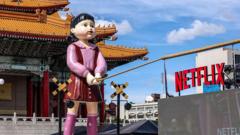Top executives from firms like Intel, Procter & Gamble, and Skechers reveal that tariff-related economic uncertainty is affecting profit forecasts, signaling potential challenges ahead for both businesses and consumers.**
Business Leaders Express Concerns Over Tariffs and Economic Uncertainty**

Business Leaders Express Concerns Over Tariffs and Economic Uncertainty**
Prominent executives from major U.S. companies warn that tariffs may hamper profit forecasts amid ongoing trade tensions.**
Major executives from prominent U.S. companies are expressing growing concerns about the impact of tariffs on their financial outlooks and the broader economy. Major players including Intel, Skechers, and Procter & Gamble have either lowered their profit predictions or completely withdrawn them due to escalating economic uncertainty.
U.S. President Donald Trump's attempts to adjust trade imbalances with key global partners through significant tariffs are beginning to show their effects. While new trade agreements have not yet been established, discussions with South Korea have reportedly shown some promise.
According to Intel's chief financial officer, David Zinsner, the shifting trade policies in the U.S. have heightened the likelihood of an economic downturn, with a rising risk of recession. The impact of these tariffs has led to increased costs, with Intel's stock dipping over 5% in response to the company's bleak revenue outlook.
Footwear manufacturer Skechers also faced backlash from investors after revising their full-year forecast downwards. COO David Weinberg admitted that the current market conditions were not conducive for providing reliable financial guidance, raising concerns among stakeholders.
Procter & Gamble, the company behind household brands like Ariel and Gillette, has hinted that tariffs may necessitate adjustments in consumer prices due to heightened material costs. Andre Schulten, P&G's financial chief, indicated that the company is actively seeking ways to manage costs while striving to keep impact on customers at a minimum.
The uncertainty brought on by tariffs isn't limited to the American market. Seven & I, the owner of 7-Eleven stores, reported feeling the pressure from trade disputes, with incoming CEO Stephen Dacus noting the challenges posed by fluctuating tariff rates.
Hyundai, the South Korean automotive giant, has also taken steps to confront the ramifications of tariffs, creating a task force aimed at strategizing for future market conditions. The company has already shifted some manufacturing from Mexico to the U.S., acknowledging that more changes may be necessary.
Amidst this backdrop, positive signals have emerged from recent trade talks between the U.S. and South Korea, with U.S. Treasury Secretary Scott Bessent reporting a successful meeting. As both nations navigate future negotiations, the potential for easing tariff pressures could provide some relief, although substantial uncertainty remains ahead as the July deadline for currently paused tariff adjustments approaches.






















